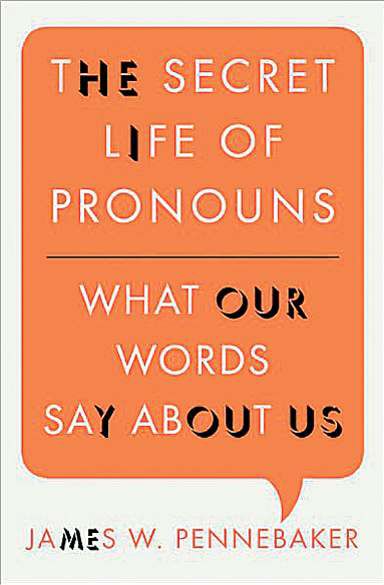‘Secret Life of Pronouns’ prompts laughs, anxiety
Published 5:00 am Sunday, September 4, 2011

- 'Secret Life of Pronouns' prompts laughs, anxiety
“The Secret Life of Pronouns: What our Words Say About Us” by James W. Pennebaker (Bloomsbury USA, 368 pgs., $28)
AUSTIN, Texas — James W. Pennebaker has spent much of his career analyzing how we speak and write. And in his latest book, “The Secret Life of Pronouns,” he finds plenty of meaning in how we use such words as “he,” “she,” “we” and “I.”
If Pennebaker were to look at the first sentence of this review, he would probably analyze the use of the word “we.”
He might say that the use of the word “we” is an attempt on my part to establish a “tight sense of group identity,” in that I’m speaking directly to a group of people who are taking the time to read what I write.
Other possible interpretations of “we” might be a “cooler, distanced, a largely impersonal we.” As Pennebaker writes, “My son rarely feels warm about his father when I say, ‘We need to take out the trash.’ … In many situations, people use the word we when they mean you. It serves as a polite form to order others around.”
Then there’s the “royal we,” as in “We are not amused.” Or there can be a purely ambiguous “we,” as in the political argument that “We need change in this country, and we deserve it!”
Pennebaker thinks “we” is a fun word because it’s sometimes used as a way to bring the speaker (or writer) closer to others “and the other half of the time to deflect responsibility away from the speaker.”
In the case of this review, it’s obviously a brazen attempt by me to make you think you and I form part of a community. Presumptuous me, perhaps.
The point, however, is this: Words “can be thought of as powerful tools to excavate people’s thoughts, feelings, motivations, and connections with others.” And Pennebaker is especially interested in using computers to follow our word trails for indications about various psychological states.
As the Regents Centennial professor and chair of the Department of Psychology at the University of Texas, Pennebaker has become a pioneer in the use of computer-based text analysis to study psychology. Anyone who reads his book will become much more conscious about how he or she uses words when talking to friends, when talking to the public, or when writing for the public.
As Pennebaker says: “Pronouns, articles, prepositions, and a handful of other small, stealthy words reveal parts of your personality, thinking style, emotional state, and connections with others. These words, typically called function words, account for less than one-tenth of 1 percent of your vocabulary but make up almost 60 percent of the words you use.”
As I’ve been writing this review, I’ve been aware that I’m simplifying Pennebaker’s arguments, in part because I recognize the limitations of space in a newspaper.
I’ve made choices, such as leaving out the computer analysis of language used on blogs after the attacks of Sept. 11, 2001. I’ve also skipped Pennebaker’s interesting analysis of the differences in Beatles songs when penned separately by John Lennon or Paul McCartney.
I’ve also been aware of my use of pronouns, and how that use applies to journalistic conventions, which generally frown upon the use of the word “I” because journalists tend to use only the third-person pronoun under the mantle of objectivity.
So I’d just like to say this: Pennebaker’s new book is fascinating and fun. But I wish it didn’t make me so self-conscious.






